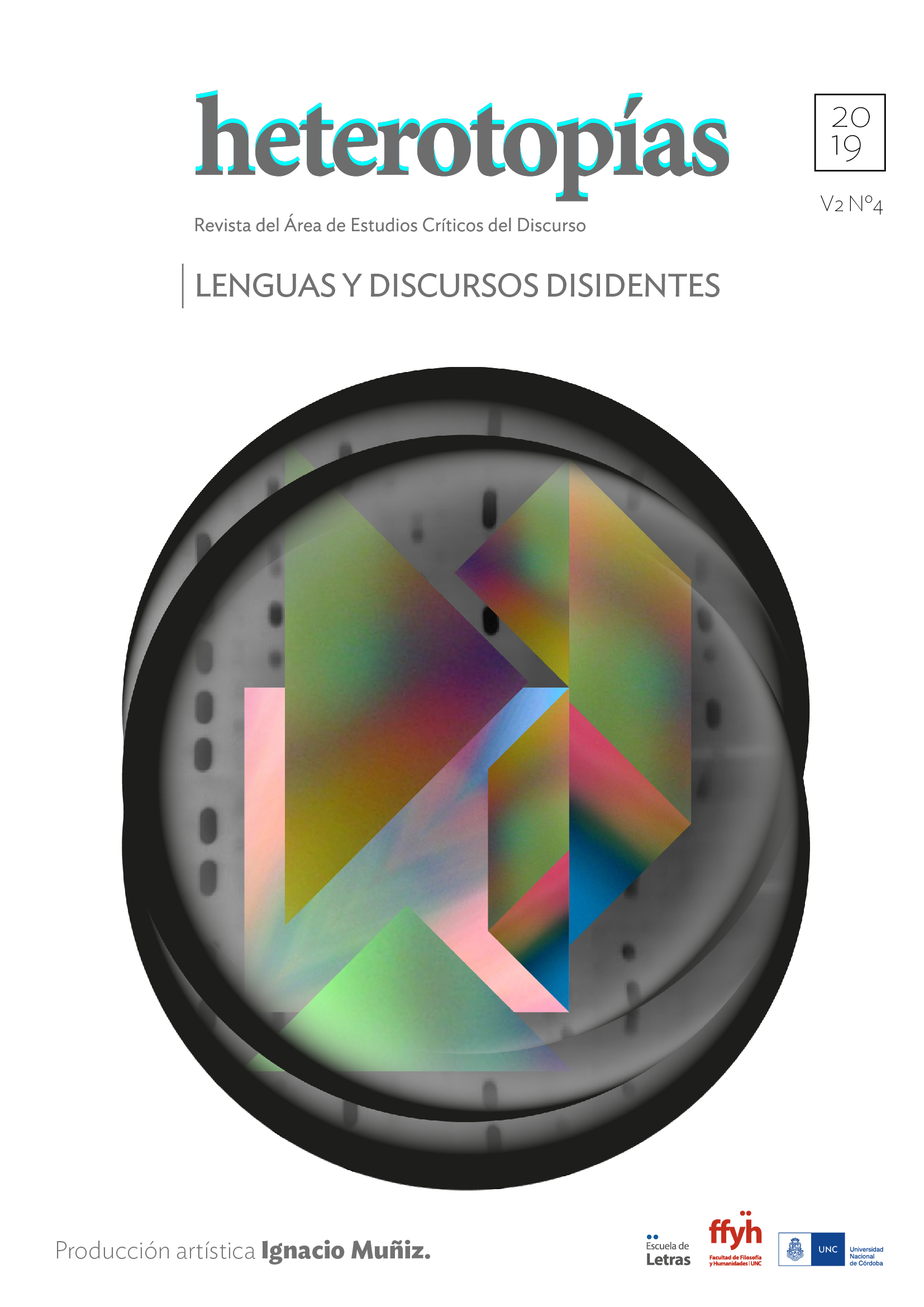Paratopic non-place and community belonging. Gabriel Casaccia and the Paraguayan exile
Main Article Content
Abstract
This article aims to make a contribution to the characterization of the Paraguayan exile culture in Argentina, based on a specific case, Gabriel Casaccia's novel Los exiliados (1966) and the reaction it generated in the context of the Paraguayan collective of the sixties. I will refer specifically to the response of Carlos Martínez Gamba, another writer, also Paraguayan and exiled as Casaccia, but whose work is based on a very different political and linguistic program. For the analysis of this episode, I resort, on the one hand, to the characterization that, from the migratory studies, was carried out around the Paraguayan migration as a community (Halpern, 2009); and, on the other hand, to the concept of paratopie (Maingueneau, 2004) in order to describe the positions that writers build on themselves or their work from their own discourse.
Downloads
Article Details
Those authors who have publications with this journal, accept the following terms: Those authors who have publications with this journal, accept the following terms:
a. The authors will keep their copyright and guarantee to the journal the right of first publication of their work, which will be simultaneously subject to the Creative Commons Attribution - Non-Commercial - Share Alike (by-nc-sa) Attribution License; no commercial use of the original work or any derivative works is allowed, the distribution of which must be done with a license equal to the one that regulates the original work.
b. Authors may adopt other non-exclusive license agreements for the distribution of the published version of the work (e.g., deposit it in an institutional telematic archive or publish it in a monographic volume) provided that the initial publication in this journal is indicated.
c. Authors are allowed and recommended to disseminate their work through the Internet (e.g. in institutional telematic archives or on their website) before and during the submission process, which may lead to interesting exchanges and increase the number of citations of the published work. (See The effect of open access).
How to Cite
References
AA. VV. (1966). Alcor, 41.
Bareiro Saguier, R. (1978). “Los intelectuales frente a la dictadura: La represión cultural en el Paraguay”. Nueva sociedad, 35, marzo-abril de 1978, 56-63.
---------- (1970). “El tema del exilio en la narrativa paraguaya contemporánea”. Cahiers du monde hispanique et lusobrésilien, 14, 79-96. Doi: https://doi.org/10.3406/carav.1970.1755
Benisz, C. (2017) “Roa Bastos, ensayista. Entre el marxismo y la recurrencia al mito”. En Dossier “Derivas intelectuales de Roa Bastos en el Centenario de su nacimiento”, Revista Paraguay desde las Ciencias Sociales, 8, 35-42. Disponible en: http://publicaciones.sociales.uba.ar/revistaparaguay
--------- (2018) La “literatura ausente”: Augusto Roa Bastos y las polémicas del Paraguay post-stronista. Buenos Aires: Sb editorial. Colección Paraguay Contemporáneo.
Block, B. (1971). La vida paraguaya en las obras de Gabriel Casaccia. Tesis de maestría. Texas Tech University. Extraido de: https://ttu-ir.tdl.org/bitstream/handle/2346/8900/31295015505075.pdf?sequence=1&isAllowed=y
Casaccia, G. (1996 [1968]). Carta-prólogo. En Vallejos, R. La literatura paraguaya como expresión de la realidad nacional. Asunción: El lector.
--------------- (1966). Los exiliados. Buenos Aires: Sudamericana.
Castells, M. (2016). “En torno a Ñorairõ ñemombe’u gérra guasúrõ guare. Guarani ñe’eepu joapype/Crónicas rimadas de la Guerra Grande de Carlos Martínez Gamba”. En Ni calco ni copia, 6, 59-86.
Cortázar, J. (2012 [1 de diciembre de 1966]). “A Mario Vargas Llosa”. En Cartas 1965-1968 3. Buenos Aires: Alfaguara.
De Diego J.L. (2000) Campo intelectual y campo literario en la Argentina (1970-1986). (Tesis doctoral). La Plata: Facultad de Humanidades y Ciencias de la Educación-UNLP.
Feito, Francisco (1977) El Paraguay en la obra de Gabriel Casaccia. Buenos Aires: Fernando García Cambeiro.
Halpern, G. (2009) Etnicidad, inmigración y política. Representaciones y cultura política de exiliados paraguayos en Argentina. Buenos Aires: Prometeo.
Lustig, W. (1997). “Ñande reko y modernidad. Hacia una nueva poesía en guaraní”. En T. Méndez-Faith, Poesía paraguaya de ayer y de hoy. Tomo II: Guaraní - español (pp. 21-48). Asunción: Intercontinental.
Lustig, W. (2003). “Tangara – ‘cosmofonía’ y emancipación estética en la nueva lírica paraguaya de expresión guaraní”. Mérida: Universidad de Los Andes.
Maingueneau, D. (2004). Le Discours littéraire. Paratopie et scène d’énonciation. Paris: Armand Colin.
Martínez Gamba C. (1969). “Gabriel Casaccia y Los exiliados”. Paraguay en América, 5-8, septiembre-diciembre de 1969, 68-69.
Palau, T. (2011). El marco expulsivo de la migración paraguaya. Migración interna y migración externa. En Halpern, G. (comp.). Migrantes. Perspectivas (críticas) en torno a los procesos migratorios (pp. 40-59). Asunción: Ápe Paraguay.
Pereira, R. (2011). El exilio, elemento de consolidación de la dictadura del general Alfredo Stroessner. En Halpern, G. (comp.). Migrantes. Perspectivas (críticas) en torno a los procesos migratorios (pp. 316-332). Asunción: Ápe Paraguay.
Portantiero, J. C. (2011 [1961]). Realismo y realidad en la literatura argentina. Buenos Aires: Eudeba.
Rama, Á. (1982). Sistema literario de la poesía gauchesca. En Los gauchipolíticos rioplatenses (pp. 155-221). Buenos Aires: Centro Editor de América Latina.
Rivera, J. (2004 [1972]). Lo arquetípico en la narrativa argentina del 40. En Mancini, A. et al. (Comps.). Ficciones argentinas. Antología de lecturas críticas. Buenos Aires: Norma.
Roa Bastos, A. (1978). Los exilios del escritor en el Paraguay. Nueva Sociedad, 35, 29-35.
Said, E. (1984). Recuerdo del invierno. Punto de vista, 22, 3-7.
Seiferheld, A. (1988). Introducción. En Seiferheld, A. y de Tone, J. L. El asilo a Perón y la caída de Epifanio Méndez. Una visión documental norteamericana (pp. 5-28). Asunción: Editorial Histórica.
Sigal, S. (2002). Intelectuales y poder en Argentina. La década del sesenta. Buenos Aires: Siglo Veintiuno de Argentina Editores.
Vallejos, R. (1996). La literatura paraguaya como expresión de la realidad nacional. Asunción: El lector.
Zarratea, T. (2011). “Carlos Martínez Gamba, poeta de la historia paraguaya”. En: http://mbatovi.blogspot.com.ar/2011/12/carlos-martinez-gamba-poeta-de-la.html
Entrevistas:
Martínez Gamba, Dora. Entrevista realizada 11/07/2019, Asunción, Paraguay.
Quiñones, Graciela. Entrevista realizada 6/04/ 2019, Casilda, Pcia. de Santa Fe.
